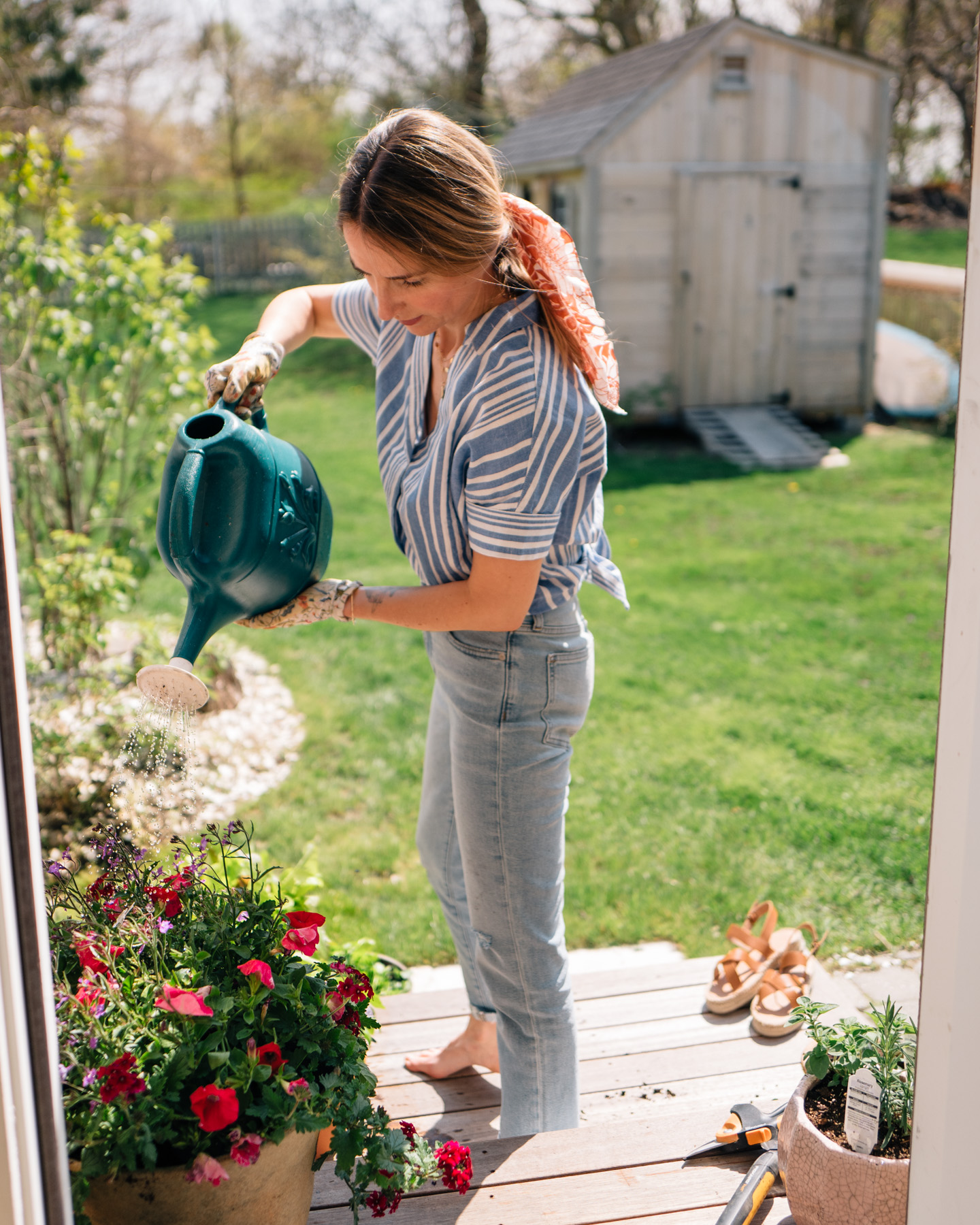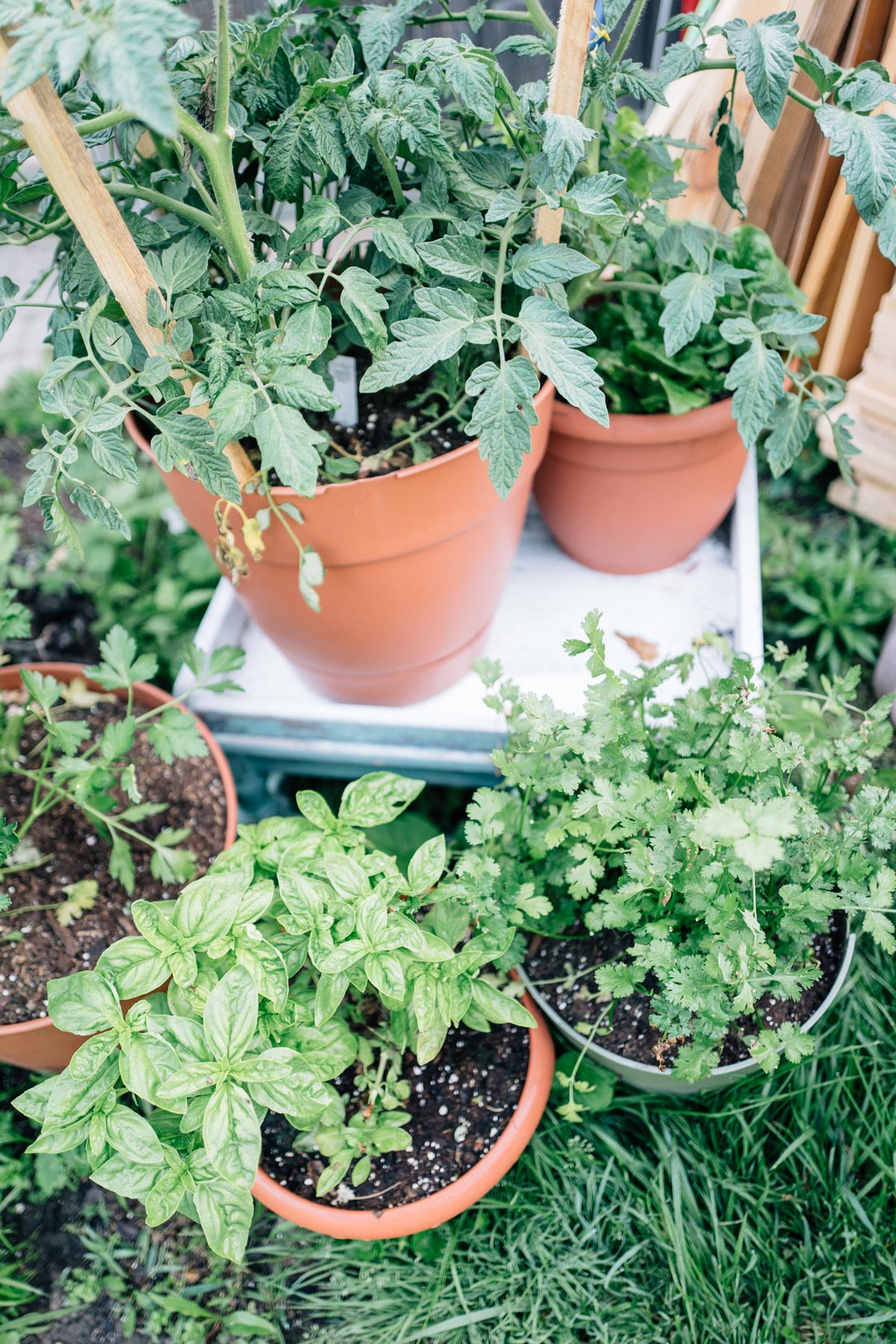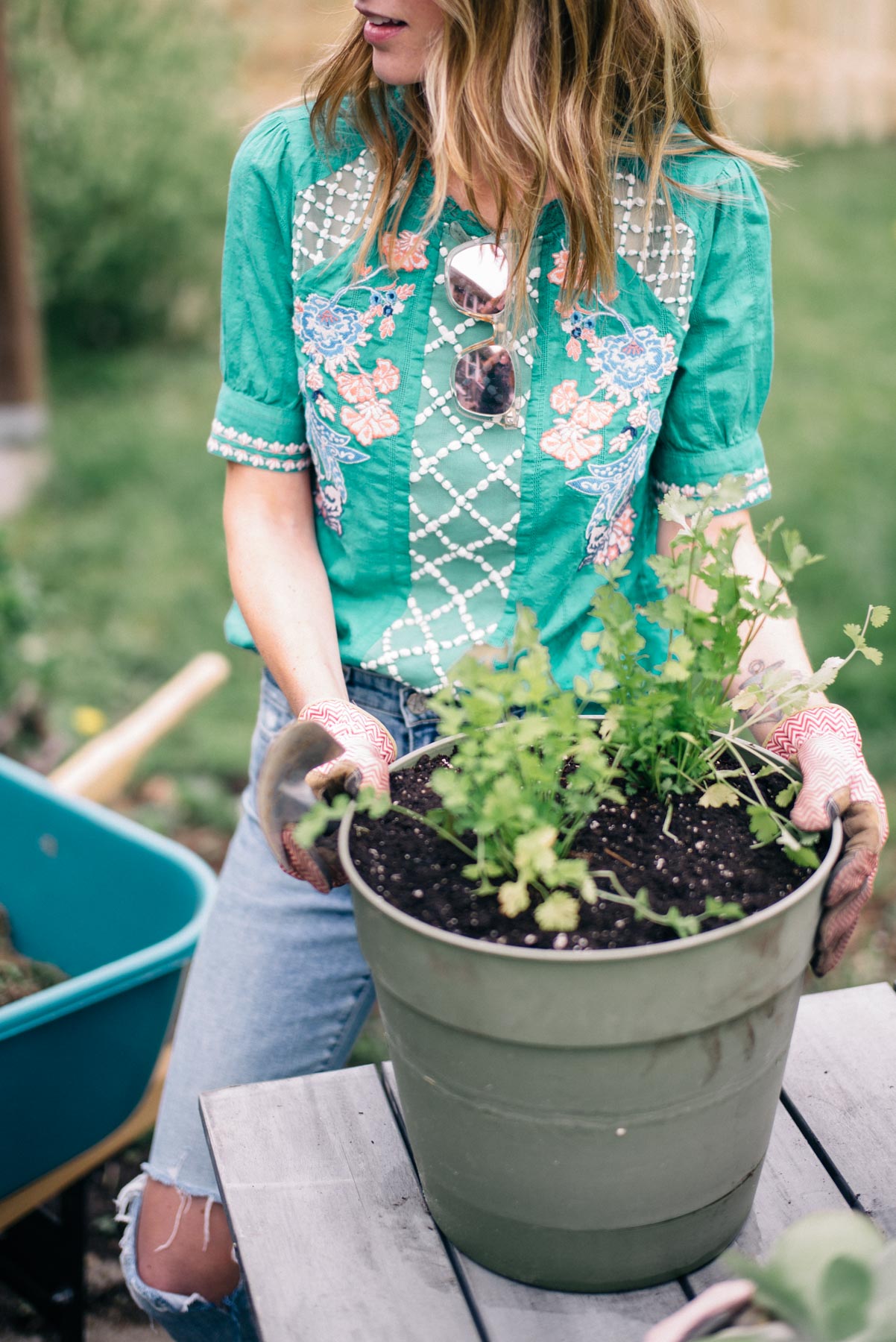One of my favorite ways to enjoy nature and spend time outside is gardening. Birds chirping, bees buzzing, and digging around in the dirt brings me so much joy. It’s one of my favorite hobbies because it’s calming and peaceful. You also reap the rewards of something you put your hard work and dedication towards. One of the best ways to start for beginners is an herb garden. They’re the best plants for gardening newbies because they are easy to grow and most require very low maintenance.
There are so many advantages to growing herbs of your own. They’re so tasty in homemade meals and will save you money at the grocery store. The nice thing about growing your own herbs is you don’t need a lot of space. They are easy to grow in pots or even on your countertop. Fresh herb plants are also fragrant and refreshing, and they can help to keep pests away as well.
If you have been wanting to start an herb garden, today’s post is for you. I am sharing all of my tips and tricks for growing herbs at home!
How To Start An Herb Garden For Beginners
Find an optimal space for growing herbs.
Unlike a vegetable garden, herb plants don’t need a big plot of land or raised beds to grow. A balcony, deck or small spot in a garden is all you need. The spot you choose must get at least 4 hours of sunlight a day. A few sun rays scattered here and there won’t get the job done. Most herbs thrive at a mild 65-70 degrees, hotter temps are fine but providing shade in extreme heat is helpful.
Pick the right herb plants to grow.
This will be a personal choice, but here are a few tips when picking the herbs for your garden. There are perennial herbs (sage, thyme, lavender, chives, or mint) and annual herbs (basil and cilantro). Perennial herbs never need replanting but annual herbs will usually have to be replanted each spring. Some annuals, like dill or fennel, are self-seeding and come back year after year. Be sure to check which type of herb you are growing so you can organize your herb garden appropriately.
Choose a container for your herbs.
Growing your herbs in pots lets you place them indoors during the winter months or move them around to maximize the hours of sunlight. They also make great decor indoors and outdoors. I love shopping for pots at second-hand stores and giving them new life with a coat of paint. I’ve also found a lot of great pots at places like Job Lot.
Prepare well-drained soil for your herb garden.
Ideal soil for growing herbs is well-draining, not too sandy or too compacted. The water should drain at a regular pace and never sit still for too long or drain too quickly. I typically buy a good organic potting soil mix for growing herbs. If you have a compost this is a great opportunity to use it as well.
Herbs don’t require fertilizer to grow, but a little goes a long way if you want to invest in some. I am a huge fan of organic Neptune’s Harvest which I use on all my garden veggies and herbs. A little goes a long way with herbs, you don’t want to over fertilize.
Don’t forget herb plants love water and sunlight.
Herbs are easy to grow, but they also can’t be totally neglected. Most herb plants need well draining soil, regular watering and ample sunlight. The best time to water growing herbs is during the cooler hours of the morning, between 6 and 10 a.m. This helps to avoid evaporation and allow the plants to absorb the water. Herbs need full sun for at least 4 hours per day, but in extreme heat they need ample shade as well.
Know when to harvest.
The ideal time to harvest herb plants is right before they start flowering. This will allow you to get the most flavor out of them. Make sure not to remove over one-third of the herb plants though. They might not grow back as expected. Here’s another pro tip: cut the herbs close to the leaf intersection to ensure they regrow quickly.
Best Herbs To Grow For Beginners
Basil:
Basil is a fast growing herb making it a great option for gardening newbies. It’s one of my favorites to grow and is so yummy on pizza, salads and more. The average basil plant gardens about half a cup of leaves a week. Basil needs well-drained, fertile soil and sunlight. In the summer months, the intensity of the sun can make basil grow quickly so shade is helpful because you want to prevent flowering. Harvesting and trimming frequently will help prevent basil from going to seed.
Thyme:
Thyme has strong antimicrobial properties and is believed to have insecticidal and antifungal properties. It’s a hardy, low-maintenance and quick-growing perennial that can survive winter temps below freezing. You can plant it during any season and expect excellent results. It’s also a delicious herb for things like marinades and broths.
Oregano:
This herb is known to be a powerful antioxidant and it is rich in antibacterial properties. Oregano thrives in dry and warm climates, so you have to be careful in the winter months. The good news is it doesn’t need as much water as many other herb plants, so it will survive if you forget to water it. It’s also a universal companion herb plant, so feel free to let it grow next to other herbs.
Parsley:
I love fresh parsley for adding to salads, pasta dishes, pizza and more. It adds a kick to any meal and is also a great garnish for many dishes. It’s a biennial, meaning it’s sown year after year from seed in spring and summer. You will find it easy to grow and very resilient, the perfect combination for your first herb garden.
Mint:
Mint is famous for being the easiest of all herb plants to grow. This herb is used in both cooking and a lot of cosmetic or skincare products. There are a few different types of mint, though, so check which one you buy for your herb garden. Mint grows sideways, so it’s definitely best to plant it in containers to prevent it from taking over your garden..
Rosemary:
Rosemary is an aromatic herb plant and its scent is very pronounced. It’s the reason why it’s widely used in air fresheners and essential oils. It’s known for its soothing benefits too. Rosemary thrives in smaller pots and full sun, so keep this in mind when caring for it.
Sage:
If you live somewhere with cooler conditions, this might be the perfect beginner’s herb plant for you. Sage is known for its resilience to frost and study flavor. Its fuzzy leaves also help to repel pests away from your entire herb garden, making the process much easier for a newbie. You can use it for cooking, candle-making, or for meditation and wellness rituals.
Chives:
Did you know these garlic-flavored herbs will give you the most beautiful flowers too? Chives bloom with a pretty pinkish purple pom-pom flower. They’re the perfect garnish to dress up a dish. However, its seeds have a reputation for invading neighboring herbs, so it’s helpful to keep chives in a separate pot. You can harvest this herb plant around three to four times a year.
Dill:
This is another one of my favorite herbs to grow. Dill is a great companion plant for cucumbers, cabbage and onions (and great for pickling!). I love to use it in dressings, soups and salads, it’s so delicious when it’s fresh. Dill should be planted in full sun.
What are your favorite herb plants?
I hope these tips are helpful and get you motivated to start growing herbs of your own. Gardening is a great way to relieve stress and get in touch with nature. It’s so rewarding to get outside and be able to enjoy your hard work with fresh ingredients. Let me know in the comments if you are growing anything this summer and what herbs are your favorites.
Disclosure: if you buy something through the links on this blog, we may earn an affiliate commission. We only feature products we would personally recommend. Thank you for your support.




These are such helpful tips! I never know when and how much to harvest herbs. This summer I’m growing basil, rosemary, thyme, mint, and chives. I have a hard time getting the less hardy herbs like basil and chives to grow, but the basil plant is actually looking good for once!
So glad it’s helpful! Basil can be tough, sometimes we have a great harvest and other times not so much. I think it really needs a good balance of sun, shade and plenty of water if it’s really hot. And definitely regular trimming, even if you don’t need to use the leaves, cut it anyway to keep it growing back and prevent it from flowering.
What do you do during the winter months? Do you just bring all yours herbs inside? We live in an apartment- east and south facing windows.